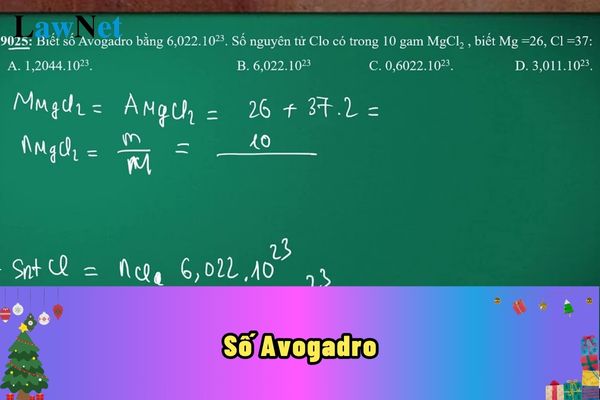Vietnam: What is the value of Avogadro's number in Chemistry? What does Chemistry study?
What is the value of Avogadro's number in Chemistry?
Avogadro's number is an important constant in chemistry, indicating the number of microscopic particles (atoms, molecules, ions) present in 1 mole of a substance.
Value of Avogadro's number: approximately 6.022 x 10^23 particles/mol.
Symbol: Commonly denoted as N_A or L.
Significance of Avogadro's number:
The link between the amount of substance (mol) and the number of particles: Thanks to Avogadro's number, we can convert between the amount of substance in moles and its microscopic particle count.
Calculations in chemistry: Avogadro's number is widely used in chemical calculations, such as calculating molar mass, molar volume, molar concentration, etc.
*Example:
1 mole of carbon atoms (C) contains 6.022 x 10^23 carbon atoms.
1 mole of water molecules (H₂O) contains 6.022 x 10^23 water molecules.
Related formula:
Number of particles = number of moles x Avogadro's number
Applications of Avogadro's number:
Chemistry: Calculations in chemical reactions, determining molar mass, molar volume.
Physics: Studying the structure of matter at the atomic and molecular level.
Biology: Studying biological processes at a molecular level.
Thus, Avogadro's number is a crucial tool that helps us better understand the microscopic world of matter and serves as a bridge between the measurable amount of substance and the minuscule number of particles that constitute that substance.
*Note: The information about the value of Avogadro's number is for reference only./.

What is the value of Avogadro's number in Chemistry? What does Chemistry study? (Image from the Internet)
What does Chemistry study?
Section 1 of the General Education Program for Chemistry in Vietnam issued under Circular 32/2018/TT-BGDDT stipulates as follows:
FEATURES OF THE SUBJECT
Chemistry is a science in the field of natural sciences, studying the composition, structure, properties, and changes of elements and compounds.
Chemistry closely combines theory and experiment and serves as a link to other natural sciences such as physics, biology, medicine, and geology. Advances in the field of chemistry are tied to new discoveries in these fields. Chemistry plays a vital role in life and production, contributing to economic and social development. Achievements in chemistry are applied in material industries, energy, pharmaceuticals, biotechnology, agriculture, forestry, fisheries, and many other fields.
Thus, Chemistry is a science that studies the composition, structure, properties, and changes of elements and compounds.
What are the 04 perspectives on developing the Chemistry curriculum in Vietnam?
Under Section 2 of the General Education Program for Chemistry issued under Circular 32/2018/TT-BGDDT, the Chemistry curriculum fully complies with the regulations stated in the General Program and emphasizes the following perspectives:
Perspective 1. Ensure continuity and development
The Chemistry curriculum inherits and promotes the strengths of the current curriculum, and assimilates the experiences of curriculum development from countries with advanced education systems around the world and in the region; at the same time, it approaches educational and chemical scientific achievements suited to the cognitive level and psychological features of students, taking into consideration Vietnam's economic and social conditions.
The Chemistry curriculum inherits and develops the educational content of the natural sciences at the lower secondary level with a concentric structure combined with a linear structure to expand and deepen students' knowledge and skills. At the lower secondary level, through the natural sciences, students get acquainted with fundamental chemistry knowledge at a qualitative, intuitive-descriptive level.
At the upper secondary level, Chemistry focuses on equipping students with fundamental chemical knowledge about the structure, properties, and applications of elements and compounds to explain the essence of chemical changes at the necessary level.
Perspective 2. Ensure practicality
The Chemistry curriculum emphasizes practicality; it avoids a tendency towards excessive calculations; it focuses on equipping students with conceptual tools and methods for using these tools, especially helping students develop experimental practical skills and apply chemical knowledge to identify and solve certain practical problems, meeting the demands of life.
Perspective 3. Implement career-orientation education
The Chemistry curriculum concretizes the goals of career-orientation education. By identifying industry areas and technology processes requiring in-depth chemical knowledge, the curriculum selects core educational content and study topics, helping students delve deeper into chemical knowledge with numerous practical applications, thus preparing them for career orientation.
Perspective 4. Promote students' activeness
The educational methods in Chemistry contribute to fostering students' activeness, initiative, and creativity, aiming to develop chemical competencies and contribute to the formation and development of the primary qualities and general competencies stipulated in the General Program.

